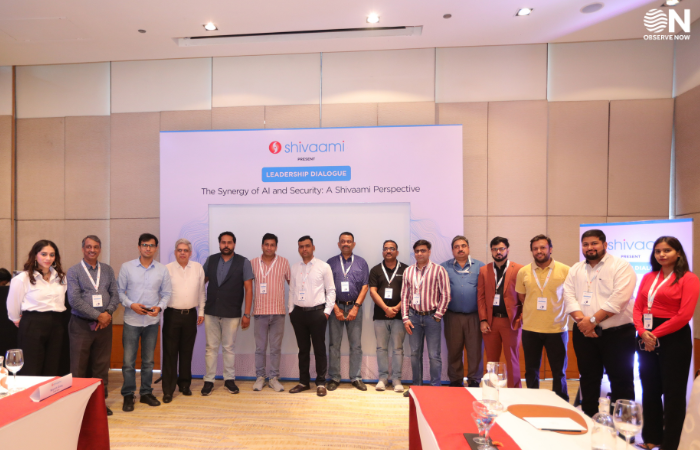CXOs Explore the Future of AI-Driven Security at ObserveNow–Shivaami Roundtable

In a bid to spotlight the convergence of Artificial Intelligence and cybersecurity, ObserveNow, in collaboration with Shivaami, hosted an exclusive, closed-door CXO Leaders Roundtable on “The Synergy of AI and Security: A Shivaami Perspective.” Held in Gurugram, the event brought together a select group of industry leaders and technology executives for a high-impact conversation on how AI is transforming enterprise security strategies and reshaping the digital future.
The session opened with a welcome note from Ms. Taniya Tikoo, Co-founder and Editor-in-Chief at ObserveNow, emphasizing the urgency of secure, intelligent infrastructure in a world increasingly defined by digital threats and operational complexity. “At ObserveNow, our mission has always been to enable conversations that matter. We don’t just report on transformation, we help shape it by bringing visionaries, innovators, and decision-makers together”.
Juned Kasmani, Associate Director at Shivaami, shared insights into how businesses are leveraging AI to enhance operational resilience and build smarter security frameworks. “We at Shivaami bring solutions and services. For that, we have onboarded Google as our digital partner. In Google Workspace, we have established a new enhancement through which a lot of associated costs can be cut out.”
Raghav Sharma, Chief Product Technology Officer at BellaVita, added a product-driven perspective to the dialogue, highlighting real-world use cases where AI has helped streamline threat detection, automate decision-making, and bolster digital trust within consumer ecosystems. “AI is evolving at a pace where many enterprises haven’t yet factored it into their technology roadmaps. It’s not just about deploying tools—it’s about securing the ecosystem they operate in. For example, if employees are accessing sensitive data through third-party apps, how do we govern that? This is where secure environments, device management, and controlled access to applications become critical,” he noted.
He added, “Organizations need to look beyond just reactive security and move towards predictive, AI-assisted frameworks. Tools like Google’s AI-powered agent systems and data classification models can help limit exposure and ensure sensitive information is only accessed by the right people.”
Another spokesperson, Deepak, highlighted, “Artificial intelligence is coming in every domain now, from personal to professional uses. One should build their organisation as one full of culture—don’t limit your employees but empower them instead. Using AI is not bad.” Mr. Amit stated, “You can’t guide each of the 200,000 users individually—you need a policy for what data can be used, in what environment, and how it’s handled. If you’re not learning AI today—whether you’re from infrastructure, project management, or any field—you’ll fall behind.”
Naveen, a speaker present in the Round-table gave his insights as well stating, “With hybrid systems coming in, there’s a greater need for accessibility—and with that, the security aspect becomes even more critical. We used to have our own servers and infrastructure to create secure environments—now, everything is moving to the cloud.” To which, Mr. Ritesh replied, “We come from a traditional industry, where everything was built step-by-step. The new industry operates differently and has its own pace. Security policies must align with the organization’s vision—it differs from organization to organization. Every industry has its own set of compliances—you can’t apply a one-size-fits-all approach to IT infrastructure policies.”
Mr. Dinkar, a spokesperson of an IT company quoted, “You need to understand and identify what kind of AI and what kind of risks are being added to your system—this must be discovered as early as possible. It’s not just about technology, but also about your paper processes and policies—AI is an additional layer on top of all this. I won’t limit how employees use AI—but I will create a framework for how to use it responsibly.”
Following the insights given by all these speakers, Juned made an announcement regarding the anticipated launch of Agentic AI in India: “Although it is not officially stated, most probably Agents will be launched in India in June 2025,” said Juned.
The roundtable fostered rich discussion on practical AI deployment, ethical considerations in security automation, and the future role of AI-powered agents in proactive defense strategies. Participants also reflected on the importance of human oversight in an AI-first world, underscoring that while machines can accelerate decisions, strategic direction still lies with people.
With its focus on actionable insights and peer-led learning, the session underscored the growing need for enterprises to adopt intelligent, secure, and scalable digital solutions. By convening voices from across industries, ObserveNow and Shivaami successfully created a space for meaningful exchange—one that promises to inspire a new wave of innovation at the intersection of AI and enterprise security.
















